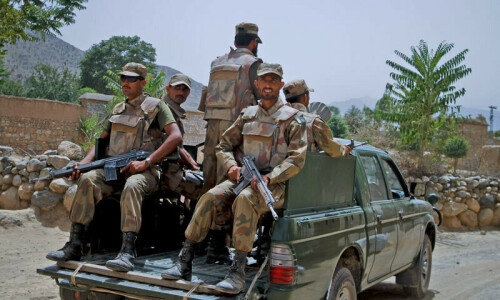ISLAMABAD, Aug 24: The government is expected to change petrol and diesel pricing formula again because the ‘corrections’ introduced last week have resulted in further losses to the national exchequer.
Sources said the revised petrol pricing formula was resulting in about 25 per cent more revenue loss than that in the old system because of an iron-clad agreement with the country’s largest oil refinery.
The diesel price was providing double subsidy to the oil marketing companies and needed to be corrected, they said.
They said that when the government changed the petrol pricing formula last week, it saved about Rs7 per litre on 47 per cent of production from four refineries located in Karachi and Islamabad, but resulted in Rs13 per litre subsidy payable to the Pak-Arab Refinery (Parco) because of a guaranteed price formula.
As a result, the government’s saving from the four refineries amounted to Rs3.8 billion per annum, but it faced a price differential payout of about Rs4.3 billion to Parco, which produce about 53 per cent of the petrol in the country.
An official at the Oil and Gas Regulatory Authority (Ogra) described the change in petrol pricing mechanism as “a blunder”. He said the revision in the formula had been introduced without proper homework and it would add a burden of over Rs500 million on the exchequer and also affect the profitability of the four refineries.
He said the correction in the formula should be across the board and it should not benefit one refinery at the cost of others without any relief to consumers.
The government had withheld the saving achieved by increasing the petroleum development levy (PDL) from Rs8 to Rs19.53 per litre to pay subsidy to Parco through inland freight equalisation margin and price differential claim.
The sources said that besides a guaranteed 25 per cent rate of return, the government had provided sovereign guarantees entitling Parco to a higher price until December although the rates for other refineries had declined by about Rs7 per litre.
They said Ogra and the other refineries had given presentations to the government on the distortion.
The government had conceded to the anomaly and agreed to change the formula on the basis of the second quarterly reports of the refineries, they said.
They said the government was paying Rs16 per litre as price differential claim to the oil companies although a correction in the formula could reduce it to about Rs10 per litre, helping it to save about Rs75 billion per year.
Under the current formula, the oil companies collected 7.5 per cent customs duty on imported products and an equivalent deemed duty on locally refined fuel, the sources said. After including the inland freight equalisation margin, dealers’ and companies’ profit and 16 per cent general sales, the price came out to be about Rs82 per litre.
Since the government is paying a price differential claim of about Rs16 per litre to the companies and refineries, the sale price is Rs64.64. Thus the government is also paying back 7.5 per cent customs and deemed duty to the industry after collecting it from the consumers.











































Dear visitor, the comments section is undergoing an overhaul and will return soon.